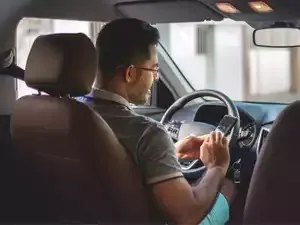In traffic-jammed Bengaluru, where silence often fills the space between commutes and conversations, one question startled a woman on her way to work, “Am I audible?”
That’s how her bike taxi driver greeted her—like a colleague would on a Zoom call.
This unusual exchange was shared by Tedx speaker, Chaarmika Nagalla on LinkedIn. Her curiosity led her to discover that the rider wasn’t a regular gig worker. He was, in fact, a full-time Infosys employee from the company’s contract management team. And it was his first day moonlighting as a bike taxi rider.
Not for money.
Not because of financial pressure.
But to make his mornings and weekends more meaningful—“instead of scrolling endlessly through social media.”
The story, posted publicly by Chaarmika, soon caught fire. Thousands engaged with it, not only for the novelty of the experience, but because it struck a chord.
The very next day, Chaarmika took another ride. This time, it was an Uber—again, to beat the Bengaluru traffic. Her rider arrived on a premium bike, geared up and professional. He, too, turned out to have a corporate day job. This time, it was a full-time role at a B2B event management company.
“Rather than ride home alone,” he told her, “I decided to complete a ride or two and have some human interaction.”
Just like the Infosys employee, he wasn’t driving for extra cash. He was simply looking for a break from routine, and maybe, someone to talk to.
To “combat loneliness.”
Another commenter mentioned a ride in Australia. There, the driver dropped her off en route to a golf session. These seemingly small interactions, people said, left a lasting impression—evidence of how random connections during transit can sometimes become the most human parts of one’s day.
It was to “meet new people and battle feelings of isolation.”
These personal stories, though anecdotal, suggest something deeper happening beneath Bengaluru’s concrete skyline and crowded roads. Professionals—often assumed to be wrapped up in their cubicles, codes, and corporate ladders—are stepping outside. Not just physically, but emotionally. And the gig economy is providing a space to do just that.
As she put it, the rides were not just about getting from one place to another. They were about “small ride stories” that reflect a larger truth.
Sometimes, it’s not the destination that matters.
It’s the conversation along the way.
That’s how her bike taxi driver greeted her—like a colleague would on a Zoom call.
This unusual exchange was shared by Tedx speaker, Chaarmika Nagalla on LinkedIn. Her curiosity led her to discover that the rider wasn’t a regular gig worker. He was, in fact, a full-time Infosys employee from the company’s contract management team. And it was his first day moonlighting as a bike taxi rider.
Not for money.
Not because of financial pressure.
But to make his mornings and weekends more meaningful—“instead of scrolling endlessly through social media.”
The story, posted publicly by Chaarmika, soon caught fire. Thousands engaged with it, not only for the novelty of the experience, but because it struck a chord.
Not an isolated incident
What made the story stick wasn’t just the single encounter. It was what happened next.The very next day, Chaarmika took another ride. This time, it was an Uber—again, to beat the Bengaluru traffic. Her rider arrived on a premium bike, geared up and professional. He, too, turned out to have a corporate day job. This time, it was a full-time role at a B2B event management company.
“Rather than ride home alone,” he told her, “I decided to complete a ride or two and have some human interaction.”
Just like the Infosys employee, he wasn’t driving for extra cash. He was simply looking for a break from routine, and maybe, someone to talk to.
Commuting for company
In the comments under Chaarmika’s LinkedIn post, more such stories surfaced. One user recalled how her partner once booked a ride and was surprised to find the driver was actually a colleague from their own company. His reason for taking the wheel on weekends?To “combat loneliness.”
Another commenter mentioned a ride in Australia. There, the driver dropped her off en route to a golf session. These seemingly small interactions, people said, left a lasting impression—evidence of how random connections during transit can sometimes become the most human parts of one’s day.
More than a side hustle
This quiet shift in professional behaviour isn’t restricted to one company or one platform. A recent example cited in the same conversation involved a Microsoft employee in Bengaluru. He chose to drive an auto-rickshaw on weekends. Again, the motivation wasn’t financial.It was to “meet new people and battle feelings of isolation.”
These personal stories, though anecdotal, suggest something deeper happening beneath Bengaluru’s concrete skyline and crowded roads. Professionals—often assumed to be wrapped up in their cubicles, codes, and corporate ladders—are stepping outside. Not just physically, but emotionally. And the gig economy is providing a space to do just that.
Loneliness in a connected city
In a city built on tech and digital connection, human interaction can still feel rare. Chaarmika Nagalla’s LinkedIn post has opened a window into this irony. Her encounters didn’t just capture public imagination—they triggered an outpouring of shared experiences that suggest this might be more common than many realise.As she put it, the rides were not just about getting from one place to another. They were about “small ride stories” that reflect a larger truth.
Sometimes, it’s not the destination that matters.
It’s the conversation along the way.








